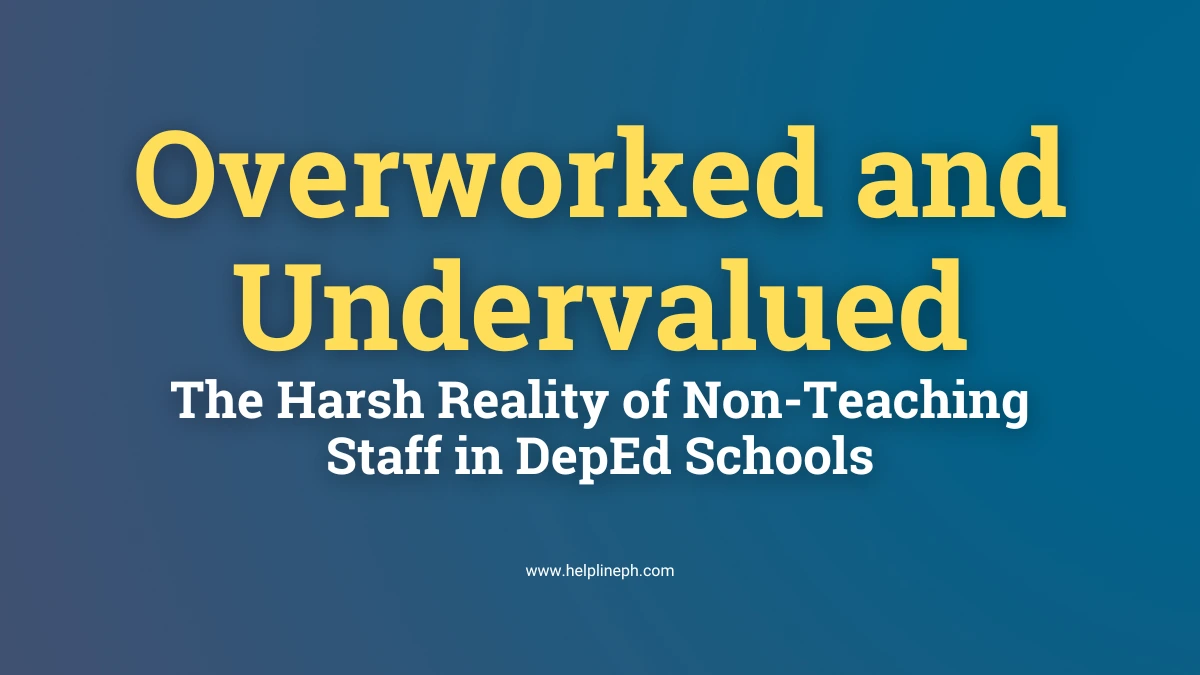Non-teaching Personnel in DepEd: A Cry for Fairness and Support
The role of non-teaching personnel in DepEd schools has always been demanding. But after the release of DepEd Order No. 2 s. 2024, many feel that their workloads have become too much to handle. I’ve worked as an Admin Assistant and Finance Officer in a big public school, and honestly, I’ve never felt this exhausted and overlooked in my life.
Let me explain why.
What Changed with DepEd Order No. 2 s. 2024?
In February 2024, DepEd issued an order that removed ancillary tasks from teachers to allow them to focus on teaching. It sounds good at first—until you realize who took over those tasks: non-teaching staff.
From that point on, Admin Assistants like me were given added responsibilities such as:
- SDRRM (School Disaster Risk Reduction Management)
- Brigada Eskwela
- Feeding Program
- WINS (Wash in Schools)
- Scouting
- Gulayan sa Paaralan
- BAC Secretariat
- And many more
On top of that, we still have to handle payroll, local funds, procurement, and MOOE (Maintenance and Other Operating Expenses). It’s too much, especially when you realize most schools have only one or two office staff.
The Problem: Too Many Tasks, Too Few People
In our school, we have around 14 to 16 non-teaching staff, but only two of us are office workers: me (Admin Assistant) and the Admin Officer. The rest are utility workers and guards. So guess what happens? We handle everything. Literally.
I do payroll, liquidation, monitor budgets, run programs like feeding and Gulayan, and even answer teacher concerns every day.
What’s worse? I also have to coordinate with the Division Office (DO), Accounting, HR, and other departments. Each one acts like they’re my boss.
Imagine handling tasks that should be split among three or four people, and doing them with zero extra pay and no overtime compensation. Weekends and holidays? They’re for catching up on work now.
Lack of Training and Orientation
Another big problem: when they gave us these tasks, they didn’t even train us. There was no proper orientation. They just handed us a list of responsibilities and expected us to figure it out.
How can you expect people to succeed in their tasks if they were never trained to do them in the first place?
Poor Delegation and No Support
What makes it even more frustrating is the lack of clear delegation. Even tasks that should fall under other departments like HR or the property custodian are being pushed to us.
Here are just a few examples:
- Payroll Masterlist: This is supposed to be HR’s job. It includes sensitive information about leave status, reactivation, and benefits eligibility. Still, it ends up with finance.
- Procurement Tasks: These should be under the Property Custodian. But again, they say it’s related to money, so it’s handed to us in finance.
- Internet Inquiries: Even calling internet providers is pushed to us—because it involves billing!
It feels like anything that involves money automatically lands on our desks.
Division Office’s Response? “Adjust.”
When we raised these issues in meetings, all we got was this response:
“Lahat naman nag-aadjust. Basta may close coordination, kaya naman.”
Even worse, the HR head once told us to stop complaining, saying:
“Isipin niyo na lang kami. Lahat ng schools sa Manila sakop namin. Adjust lang.”
So instead of solving the problem, we’re told to keep quiet and deal with it.
Division vs. School Assignments: A Huge Gap
It’s very clear that non-teaching personnel assigned in Division Offices have more structured and focused roles. If you’re stationed in HR, you only deal with HR tasks. If you’re in Accounting, you focus on finance.
But in schools? You’re an all-around staff. No boundaries. No limits. And when your only teammate is on leave? You’re left to do it all alone.
Worse, you’re answerable not only to your principal but also to every department at the Division Office. That’s too many bosses for one person.
Emotional and Mental Strain
All of this takes a toll not just physically but mentally. I’ve started bringing home my frustrations. I get irritated even with my family, and I know it’s not healthy anymore.
I’ve thought about transferring to another agency or applying for a different job. But like many others, I have loans and responsibilities. Quitting isn’t that simple.
What We’re Asking For
We’re not asking for the moon. We’re simply asking for:
- Proper delegation of tasks
- Training and support
- Clear job roles
- Additional manpower
- Fair workload distribution
We want to be efficient, but we can’t do that if we’re burnt out and unsupported.
What Other Non-Teaching Staff Are Saying
I’m not alone. Many Admin Assistants and Admin Officers in different divisions are feeling the same way. Some are handling two to three schools, while others are in constant conflict with their colleagues due to unclear responsibilities.
One Admin Officer even admitted that they passed on procurement work to finance just because it “involves money.”
Another shared that they quit the DepEd entirely because of the toxic workload and lack of respect for non-teaching staff.
Frequently Asked Questions (FAQs)
What is DepEd Order No. 2 s. 2024?
It is an order that removed ancillary tasks from teachers to help them focus more on teaching. However, these tasks were passed on to non-teaching personnel without proper planning or manpower.
Who are considered non-teaching personnel in DepEd?
They include Admin Assistants, Admin Officers, Project Development Officers, Utility Workers, Security Staff, and other support staff in schools and division offices.
Why are non-teaching staff complaining?
Because of the sudden increase in workload, lack of training, poor delegation, and no additional pay or support.
Is there a difference between being assigned in a school versus the Division Office?
Yes. In the Division Office, you have specific tasks related to your department. In schools, non-teaching staff are often forced to do multiple jobs, even outside their original scope.
Final Thoughts
Non-teaching personnel in DepEd are vital to the success of schools. Yet, we are often ignored, overworked, and undervalued.
We are not asking for special treatment—just fairness, respect, and support.
If DepEd truly wants to improve the education system, it must start by listening to its silent workforce—the non-teaching staff who keep everything running behind the scenes.






